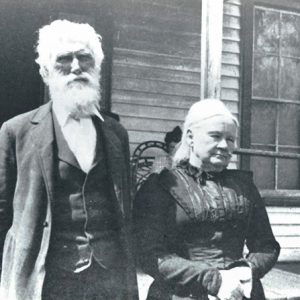calsfoundation@cals.org
James Rutherford (1825–1914)
James Rutherford fought at the Battle of Shiloh during the Civil War. He later became a political leader in Independence County, serving in the Arkansas General Assembly.
James Rutherford was born on July 7, 1825, in Rutherfordton, Rutherford County, North Carolina, to Walter Blythe Rutherford Sr. and Sarah McTyre Rutherford; he was the fourth of nine children. His father had migrated from Jedburgh, Scotland, in the winter of 1815 to Rutherford County, which was named after other members of the family who lived there before the American Revolution.
In February 1849, Rutherford traveled to Independence County in Arkansas for his father to collect a $3,000 debt from a man named Dillingham; this was money owed to his uncle Jimmie Rutherford. The debtor had recently purchased land in the area from Colonel Morgan Magness. James Rutherford took the land in lieu of the money owed. That was the first land owned by the Rutherford family in the county. Rutherford became a leader in Independence County politics soon after arrival and was elected justice of the peace in 1850 at age twenty-five. Before leaving North Carolina, he had been initiated into the Odd Fellows.
James Rutherford’s parents, who had been members of the Presbyterian church of Rutherfordton, joined him on the White River in Independence County in 1850. The next year, Walter Rutherford Sr. was elected and installed ruling elder of the Presbyterian church of Batesville (Independence County), which had formerly had no pastor. Walter and Sarah are buried in the Rutherford Cemetery.
When the Civil War began, James Rutherford enlisted as a first lieutenant in John H. Dye’s Company in the Seventh Arkansas Infantry (CS). He succeeded Dye in command at Bowling Green, Kentucky, in 1862. He was promoted to lieutenant colonel on the battlefield of Shiloh, Tennessee, on April 6–7, 1862. He resigned from the Seventh on July 1, 1862, and returned to Arkansas, where be became captain and quartermaster in the Forty-sixth Arkansas (Mounted) Regiment. He was captured in Jackson County on January 27, 1864, and imprisoned in Little Rock (Pulaski County) until Major General Frederick Steele ordered his release on July 14, 1864. Rutherford surrendered with General M. Jeff Thompson on May 11, 1865, and was paroled at Jacksonport (Jackson County) on June 5, 1865.
Returning home from the war, Rutherford was again a gentleman farmer. He had married Mariah Louisa Hynson—the daughter of Henry Ringgold Hynson, who was a Batesville merchant, and Eliza Ann Magness Hynson—in 1862. The couple had four sons and two daughters.
Rutherford started with 160 acres deeded to him by his father and added to it until he became one the major landowners in the county, also holding land in neighboring Jackson County. By 1881, he had 750 acres under cultivation on three farms, renting and cultivating on the share system, and he shipped about 250 bales of cotton annually. He was also noted for being a successful stockman and even dabbled in merchandizing at one time at Big Bottom. He also had Rutherford’s Landing on the White River across from the Goodie Creek Valley.
Rutherford became active in local and state politics during Reconstruction. Although originally a Whig and at first opposed to secession, he had fought for the South and joined the Democratic Party. His name appears on the list as a contributor to the initial building fund in 1872 for the Sulphur Rock Male and Female Academy, the beginning of the Sulphur Rock School System. In 1874, Arkansas adopted a new state constitution. County delegates to the constitutional convention in Little Rock (Pulaski County) were James W. Butler and Rutherford. In 1879, Rutherford was elected to a four-year term as state senator for Independence and Stone counties. During the session of 1880, he was chairman of the finance committee, as well as of the special Senate committee on revenue. The Encyclopedia of the New West in 1881 gave this description of Rutherford when he was a senator: “He stands six feet two inches high, weighs 165 pounds, has gray eyes and a physique that proclaims, ‘Here’s a man.’ He is a personal friend to some whom he opposes politically, which shows the discriminating character of his mind. He is regarded as the best financier in Independence County.”
The Rutherford family has long held prominence in Independence County. His younger brother, Captain George Wherry Rutherford, was a Confederate army captain who enlisted in the Second Arkansas Cavalry in 1862, serving until the war ended in 1865. One of their sisters, Mary Ann Rutherford, married David Caldwell Montgomery, who was active in helping found the First Presbyterian Church in Batesville in 1842, the second-oldest church in the Arkansas Presbytery. One of Rutherford’s sons, William Alexander Rutherford, became a successful Batesville businessman, serving as a director of both the First National Bank and the Union Bank and Trust Company. The colonel’s great-great-grandson, James Luin “Skip” Rutherford III, is a leader in Arkansas politics, being a key advisor to Bill Clinton during his 1992 presidential campaign and becoming dean of the University of Arkansas Clinton School of Public Service.
James Rutherford died at his home on February 6, 1914. He is buried in the Rutherford Cemetery just off Gap Road in Batesville. The Rutherford house still stands on Gap Road.
For additional information:
Biographical and Historical Memoirs of Northeast Arkansas. Chicago: Goodspeed Publishing Co., 1889.
Hembrey, Shea, Jennifer Richardson, and George Lankford. “Rutherford Recollections of the Battle of Shiloh.” Independence County Chronicle 39 (October 1987–January 1988): 48–50.
McGinnis, A. C. “A History of Independence County, Ark.” Special issue. Independence County Chronicle 17 (April 1976).
Speer, William S. “Honorable James Rutherford, Batesville.” The Encyclopedia of the New West. Marshall, TX: United States Biographical Pub. Co., 1881. Online at: https://familysearch.org/search/catalog/1567154 (accessed September 1, 2020).
Kenneth Rorie
Van Buren, Arkansas
 Politics and Government
Politics and Government Post-Reconstruction through the Gilded Age, 1875 through 1900
Post-Reconstruction through the Gilded Age, 1875 through 1900 Rutherford (Independence County)
Rutherford (Independence County) James and Mariah Rutherford
James and Mariah Rutherford 



Comments
No comments on this entry yet.